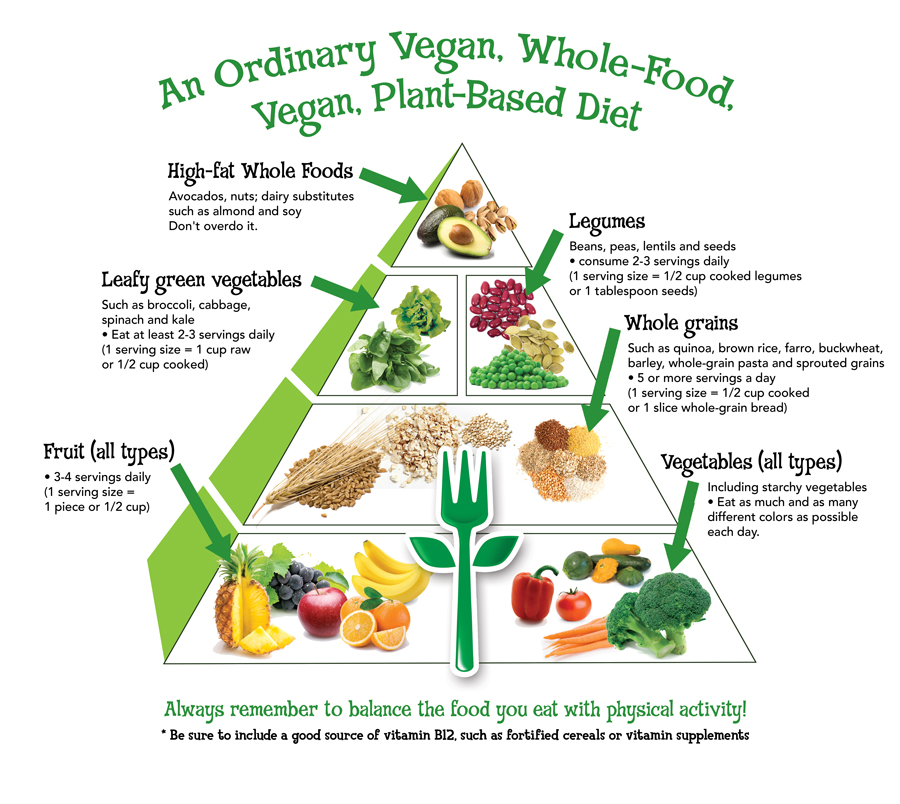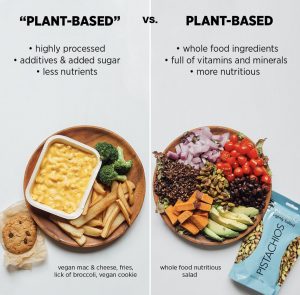Everything About Healthy And Balanced Food: Advantages of Checking Out Plant Based Options
The conversation surrounding plant-based diet plans has gotten considerable interest recently. Many people are discovering the potential health advantages, dietary benefits, and ecological impacts related to these dietary choices. As individuals become much more familiar with their food's influence on wellness and sustainability, concerns arise regarding the practicalities of embracing such a lifestyle. What specific changes can one expect, and exactly how might these selections reshape not just individual health and wellness yet likewise the earth's future?
Understanding Plant-Based Diet Plans
Although many individuals link plant-based diet regimens mostly with vegetarianism or veganism, these diet regimens can include a variety of eating patterns that focus on whole, minimally processed plant foods. Such diets often consist of fruits, vegetables, entire grains, beans, seeds, and nuts, while restricting or removing animal items. This flexibility enables people to customize their nutritional choices according to individual choices and nutritional needs. Some might adopt a mostly plant-based diet while still sometimes consuming meat or dairy, commonly described as a flexitarian method. The emphasis continues to be on integrating even more plant foods, which can bring about a varied range of flavors and meals. Recognizing these various interpretations of plant-based consuming is important for appreciating its accessibility and appeal in contemporary food culture.
Health And Wellness Conveniences of Plant-Based Foods
The wellness benefits of plant-based foods are significant, supplying a nutrient density benefit that sustains total well-being. Research suggests that these foods can boost heart health and play a necessary duty in reliable weight monitoring. By integrating extra plant-based alternatives, people might boost their dietary choices and advertise long-term health and wellness.
Nutrient Thickness Benefit
Nutrient thickness plays a necessary function in the wellness advantages of plant-based foods, making them a compelling option for those seeking a well balanced diet regimen. Plant-based foods, such as fruits, veggies, vegetables, nuts, and whole grains, are often rich in essential vitamins, minerals, and antioxidants while being reduced in calories. This high nutrient density enables individuals to eat fewer calories while still fulfilling their dietary requirements. Furthermore, these foods are packed with dietary fiber, advertising digestive system health and wellness and helping in weight management. By incorporating nutrient-dense plant-based alternatives, consumers can enhance their total health and wellness, support their body immune systems, and lower the danger of chronic conditions. Eventually, the nutrient density of plant-based foods underscores their relevance in a health-conscious way of life.
Heart Health Renovation

Weight Management Support
In enhancement to advertising heart wellness, a plant-based diet can significantly help in weight management. This nutritional method stresses entire foods such as fruits, vegetables, beans, nuts, and entire grains, which are generally reduced in calories and higher in fiber contrasted to animal-based products. The high fiber web content helps enhance satiety, minimizing overall calorie intake. Furthermore, plant-based diet regimens are typically abundant in vital nutrients while reduced in undesirable fats, making it less complicated to preserve a healthy and balanced weight. Sugar Free Sauces. Research study shows that individuals who embrace a plant-based way of living tend to have lower body mass indexes (BMIs) and experience even more effective weight reduction contrasted to those that consume meat-heavy diets. Accepting plant-based choices is a critical choice for effective weight administration.
Nutritional Worth of Plant-Based Active Ingredients
Plant-based ingredients are rich in vital nutrients, using a varied selection of vitamins, minerals, and anti-oxidants that add to overall health. A comparison of protein sources exposes that while animal products are typically considered as premium, several plant-based alternatives give ample healthy protein and various other valuable substances. Recognizing the dietary worth of these components can assist individuals make informed dietary selections.
Essential Nutrients in Plants
Nutrient-rich active ingredients located in plants supply a varied variety of necessary minerals and vitamins that contribute significantly to overall health. These active ingredients are abundant in vitamins A, C, and K, which support immune function, vision, and blood clot, specifically. In addition, plants provide important minerals such as calcium, magnesium, and potassium, critical for heart health and wellness, muscle mass function, and bone stamina. The visibility of fiber in plant-based foods help digestion and advertises a healthy gut microbiome. Anti-oxidants, discovered abundantly in vegetables and fruits, aid battle oxidative stress and lower swelling. Furthermore, many plant foods are reduced in calories yet high in nutrients, making them an outstanding selection for those seeking to keep a healthy weight while ensuring suitable nutrient intake.
Contrasting Protein Sources
Protein sources differ substantially in their dietary accounts, with plant-based components providing distinct advantages. Unlike pet healthy proteins, which commonly consist of click this saturated fats and cholesterol, plant proteins tend to be reduced in these undesirable elements. Legumes, nuts, seeds, and whole grains are abundant in necessary amino acids, fiber, vitamins, and minerals. For circumstances, lentils offer high protein web content along with considerable iron and folate, while quinoa is a complete healthy protein, using all nine crucial amino acids. Additionally, plant-based healthy proteins are typically accompanied by anti-oxidants and phytochemicals that support total health. The change to plant-based protein resources not only boosts nutritional consumption but additionally aligns with lasting dietary techniques, decreasing environmental influence and promoting lasting health advantages.
Environmental Influence of Plant-Based Eating
As recognition of environment change grows, many individuals are discovering sustainable dietary selections that can significantly decrease their environmental footprint. Plant-based consuming has become a substantial contributor to minimizing greenhouse gas exhausts, which are mainly connected with animals production. The growing of fruits, legumes, grains, and vegetables normally calls for less resources, such as water and land, compared to animal farming. Furthermore, plant-based diet regimens can bring More hints about decreased deforestation, as less land is needed for grazing animals or expanding pet feed. By changing in the direction of plant-based options, consumers can support biodiversity and promote healthier environments. On the whole, embracing plant-based eating not only benefits personal health but also represents an important step toward environmental sustainability and conservation efforts.
Overcoming Common Misconceptions
While numerous individuals recognize the advantages of a plant-based diet, numerous false impressions often discourage them from totally welcoming this way of living. A common belief is that plant-based diet regimens do not have enough healthy protein; nonetheless, countless plant resources, such as vegetables, nuts, and tofu, give enough healthy protein. Furthermore, some presume that this diet is costly, when in truth, learn the facts here now staples like beans, rice, and seasonal vegetables can be quite economical. Another misunderstanding is that plant-based eating is overly limiting, whereas it really provides a diverse array of foods and tastes. Lastly, many stress that a plant-based diet regimen might result in deficiencies, yet with correct planning, individuals can get all essential nutrients, including vitamins and minerals, while enjoying a wide range of delicious dishes.
Tips for Transitioning to a Plant-Based Way of living
Making the shift to a plant-based way of living can be an enhancing experience, though it often needs some guidance to navigate the first adjustments. Individuals are motivated to start slowly, integrating even more fruits, vegetables, vegetables, and entire grains right into their meals while minimizing meat and milk consumption. Dish planning is necessary; preparing a weekly menu can assist relieve the modification and avoid last-minute undesirable choices. Checking out new recipes and cooking methods can likewise boost the experience and preserve excitement about plant-based eating. In addition, signing up with support teams or communities can supply motivation and share important ideas. Remaining informed about nutrition guarantees balanced dishes, protecting against deficiencies while cultivating a healthy and balanced, satisfying plant-based way of life.

Delicious Plant-Based Dish Ideas
Checking out tasty plant-based meal concepts can inspire individuals to welcome an extra healthy diet plan. One popular alternative is a hearty quinoa salad, including cherry tomatoes, cucumber, and a zesty lemon-tahini clothing. One more fave is a full-flavored lentil stew, loaded with carrots, celery, and fragrant natural herbs, excellent for a calming supper. For breakfast, over night oats made with almond milk, chia seeds, and topped with fresh berries provide a healthy begin to the day. Additionally, a lively veggie stir-fry with tofu and a range of vibrant veggies can be a fast yet satisfying meal. Luscious avocado toast on whole-grain bread, sprinkled with seeds and seasonings, supplies a basic yet flavorful treat. These meals display the variety and richness of plant-based eating.

Regularly Asked Questions
Can a Plant-Based Diet Plan Supply Enough Healthy Protein?
The concern of whether a plant-based diet regimen can provide sufficient protein prevails. Countless resources, consisting of beans, nuts, seeds, and entire grains, can satisfy protein requires effectively, sustaining a nutritious and balanced diet regimen for people.
Are Plant-Based Diets Appropriate for Children?
The suitability of plant-based diet plans for youngsters depends on mindful planning. Sufficient nutrients must be guaranteed, including minerals, healthy proteins, and vitamins. With proper guidance, such diets can sustain healthy and balanced development and growth in children.
Exactly how Do I Eat Out on a Plant-Based Diet plan?
Eating in restaurants on a plant-based diet regimen involves looking for restaurants with varied food selections, requesting modifications, and checking out vegan-friendly options. Preparation in advance and communicating nutritional choices can boost the dining experience while preserving dietary options.
What Are Usual Irritants in Plant-Based Foods?
Common irritants in plant-based foods consist of soy, gluten, nuts, and seeds - Plant Based Chicken. Individuals complying with a plant-based diet plan should recognize these irritants and read labels carefully to stay clear of adverse reactions and ensure risk-free intake
Can Plant-Based Diets Aid With Weight-loss?
Research suggests that embracing a plant-based diet regimen may assist in weight management as a result of its usually reduced calorie thickness and higher fiber content. This combination can boost satiety, aiding individuals handle their caloric intake efficiently. Many people associate plant-based diet plans generally with vegetarianism or veganism, these diets can incorporate a broad array of eating patterns that prioritize whole, minimally refined plant foods. Nutrient thickness plays an important function in the health and wellness advantages of plant-based foods, making them an engaging choice for those seeking a well balanced diet regimen. Plant-based diet regimens have been revealed to markedly enhance heart health, as they typically consist of elements that sustain cardiovascular feature. In addition to advertising heart health, a plant-based diet regimen can considerably help in weight management. A common idea is that plant-based diets lack adequate healthy protein; nevertheless, numerous plant resources, such as beans, nuts, and tofu, offer enough healthy protein.